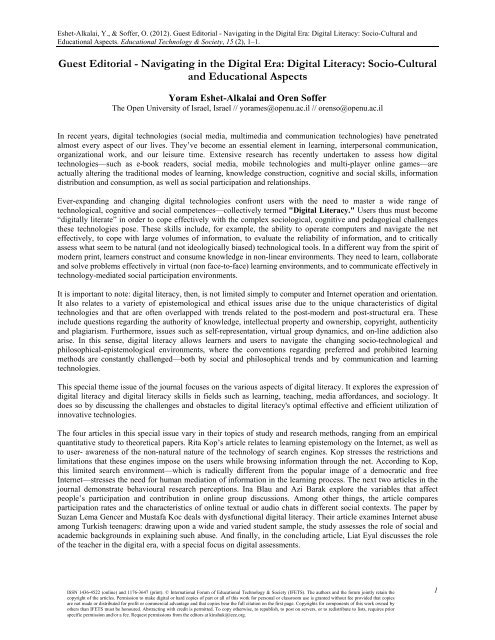April 2012 Volume 15 Number 2 - Educational Technology & Society
April 2012 Volume 15 Number 2 - Educational Technology & Society
April 2012 Volume 15 Number 2 - Educational Technology & Society
Create successful ePaper yourself
Turn your PDF publications into a flip-book with our unique Google optimized e-Paper software.
Eshet-Alkalai, Y., & Soffer, O. (<strong>2012</strong>). Guest Editorial - Navigating in the Digital Era: Digital Literacy: Socio-Cultural and<br />
<strong>Educational</strong> Aspects. <strong>Educational</strong> <strong>Technology</strong> & <strong>Society</strong>, <strong>15</strong> (2), 1–1.<br />
Guest Editorial - Navigating in the Digital Era: Digital Literacy: Socio-Cultural<br />
and <strong>Educational</strong> Aspects<br />
Yoram Eshet-Alkalai and Oren Soffer<br />
The Open University of Israel, Israel // yorames@openu.ac.il // orenso@openu.ac.il<br />
In recent years, digital technologies (social media, multimedia and communication technologies) have penetrated<br />
almost every aspect of our lives. They’ve become an essential element in learning, interpersonal communication,<br />
organizational work, and our leisure time. Extensive research has recently undertaken to assess how digital<br />
technologies—such as e-book readers, social media, mobile technologies and multi-player online games—are<br />
actually altering the traditional modes of learning, knowledge construction, cognitive and social skills, information<br />
distribution and consumption, as well as social participation and relationships.<br />
Ever-expanding and changing digital technologies confront users with the need to master a wide range of<br />
technological, cognitive and social competences—collectively termed "Digital Literacy." Users thus must become<br />
“digitally literate” in order to cope effectively with the complex sociological, cognitive and pedagogical challenges<br />
these technologies pose. These skills include, for example, the ability to operate computers and navigate the net<br />
effectively, to cope with large volumes of information, to evaluate the reliability of information, and to critically<br />
assess what seem to be natural (and not ideologically biased) technological tools. In a different way from the spirit of<br />
modern print, learners construct and consume knowledge in non-linear environments. They need to learn, collaborate<br />
and solve problems effectively in virtual (non face-to-face) learning environments, and to communicate effectively in<br />
technology-mediated social participation environments.<br />
It is important to note: digital literacy, then, is not limited simply to computer and Internet operation and orientation.<br />
It also relates to a variety of epistemological and ethical issues arise due to the unique characteristics of digital<br />
technologies and that are often overlapped with trends related to the post-modern and post-structural era. These<br />
include questions regarding the authority of knowledge, intellectual property and ownership, copyright, authenticity<br />
and plagiarism. Furthermore, issues such as self-representation, virtual group dynamics, and on-line addiction also<br />
arise. In this sense, digital literacy allows learners and users to navigate the changing socio-technological and<br />
philosophical-epistemological environments, where the conventions regarding preferred and prohibited learning<br />
methods are constantly challenged—both by social and philosophical trends and by communication and learning<br />
technologies.<br />
This special theme issue of the journal focuses on the various aspects of digital literacy. It explores the expression of<br />
digital literacy and digital literacy skills in fields such as learning, teaching, media affordances, and sociology. It<br />
does so by discussing the challenges and obstacles to digital literacy's optimal effective and efficient utilization of<br />
innovative technologies.<br />
The four articles in this special issue vary in their topics of study and research methods, ranging from an empirical<br />
quantitative study to theoretical papers. Rita Kop’s article relates to learning epistemology on the Internet, as well as<br />
to user- awareness of the non-natural nature of the technology of search engines. Kop stresses the restrictions and<br />
limitations that these engines impose on the users while browsing information through the net. According to Kop,<br />
this limited search environment—which is radically different from the popular image of a democratic and free<br />
Internet—stresses the need for human mediation of information in the learning process. The next two articles in the<br />
journal demonstrate behavioural research perceptions. Ina Blau and Azi Barak explore the variables that affect<br />
people’s participation and contribution in online group discussions. Among other things, the article compares<br />
participation rates and the characteristics of online textual or audio chats in different social contexts. The paper by<br />
Suzan Lema Gencer and Mustafa Koc deals with dysfunctional digital literacy. Their article examines Internet abuse<br />
among Turkish teenagers: drawing upon a wide and varied student sample, the study assesses the role of social and<br />
academic backgrounds in explaining such abuse. And finally, in the concluding article, Liat Eyal discusses the role<br />
of the teacher in the digital era, with a special focus on digital assessments.<br />
ISSN 1436-4522 (online) and 1176-3647 (print). © International Forum of <strong>Educational</strong> <strong>Technology</strong> & <strong>Society</strong> (IFETS). The authors and the forum jointly retain the<br />
copyright of the articles. Permission to make digital or hard copies of part or all of this work for personal or classroom use is granted without fee provided that copies<br />
are not made or distributed for profit or commercial advantage and that copies bear the full citation on the first page. Copyrights for components of this work owned by<br />
others than IFETS must be honoured. Abstracting with credit is permitted. To copy otherwise, to republish, to post on servers, or to redistribute to lists, requires prior<br />
specific permission and/or a fee. Request permissions from the editors at kinshuk@ieee.org.<br />
1

















